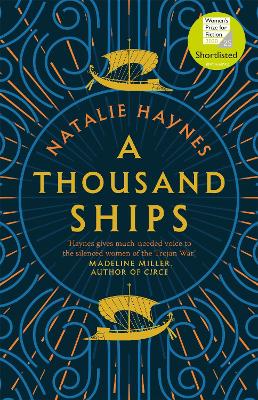Reviewed by brokentune on
Calliope:
Sing, Muse, he said, and I have sung.
I have sung of armies and I have sung of men.
I have sung of gods and monsters, I have sung of stories and lies.
I have sung of death and of life, of joy and of pain.
I have sung of life after death.
And I have sung of the women, the women in the shadows.
I have sung of the forgotten, the ignored, the untold.
I have picked up the old stories and I have shaken them until the hidden women appear in plain sight.
I have celebrated them in song because they have waited long enough.
Just as I promised him: this was never the story of one woman, or two. It was the story of all of them. A war does not ignore half the people whose lives it touches. So why do we? They have waited to have their story told, and I will make them wait no longer. If the poet refuses the song I have offered him, I will take it away and leave him silent. He has sung before: he may not want it and does not need it. But the story will be told. Their story will be told, no matter how long it takes. I am ageless, undying: time does not matter to me.
All that matters is the telling.
Sing, Muse, he said.
Well, do you hear me?
I have sung.
Well, this was utterly fantastic.
Stomach-turning, bloody, violent, cruel, disgusting, and utterly fantastic.
Yes, this is a retelling of the story of the fall of Troy, but it is also a lot more. A Thousand Ships does not focus on the siege and the battles and the heroes. The story and what happens after the fall of Troy is told through the points of view of the women of Troy, who lost all, the mothers of the "heroes", the wives, the daughters.
Some deeds cast long shadows, and here we have shadows dancing like the Furies, engulfed in black flames, destroying everything in their quest for vengeance.
Oh, and there are bickering gods and goddesses, too, just for some light relief.
What I would be interested to know is how this all works for readers who are not familiar with the underlying stories. I mean I found it gripping, and I know the characters. I would love to know what others make of this book.
Also, this is my second book by Haynes. I picked up her The Amber Fury a few months ago on a whim, and acquired her other books after reading it because I was stunned. I am now a confirmed fan of the author.
She can write, absolutely, but I am also impressed by her attention to detail, research efforts, and general handling of the source material.
There is an enlightening Afterword to this book that is as relevant and worth reading as the stories told in A Thousand Ships themselves.
"I hope that at the end of this book, my attempt to write an epic, readers might feel that heroism is something that can reside in all of us, particularly if circumstances push it to the fore. It doesn’t belong to men, any more than the tragic consequences of war belong to women. Survivors, victims, perpetrators: these roles are not always separate. People can be wounded and wounding at the same time, or at different times in the same life."
Reading updates
- Started reading
- 6 April, 2020: Finished reading
- 6 April, 2020: Reviewed
